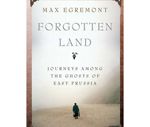Book Review: Forgotten Land: Journeys among the ghosts of East Prussia
A moving account of the tragedies of East Prussia is recommended by Philip Marsden


To order any of the books reviewed or any other book in print, at discount prices* and with free p&p to UK addresses, telephone theCountry Life Bookshop on Bookshop 0843 060 0023. Or send a cheque/postal order to theCountry Life Bookshop, PO Box 60, Helston TR13 0TP * See individual reviews for CL Bookshop price
Forgotten Land: Journeys among the ghosts of East Prussia
Max Egermont (Picador, £20, *£18)
In August 1934, Gen Paul von Hindenburg, president of Germany and hero of the First World War, was buried at the Tannenburg Memorial in East Prussia. His Pickelhaube the spiked Prussian helmet of countless cartoons-lay on his coffin. Hitler made the address, in which he said that henceforth he himself would be chancellor, president and head of the armed forces. German militarism was on the rise, and in the eastern borderlands of Prussia lay its deep and ancient source. Yet, just over 10 years later, the entire German population of East Prussia was fleeing west, leaving for good the land the Teutonic Knights had first occupied seven centuries earlier.
The experience of reading Max Egremont's wonderful evocation of the final years of East Prussia is like watching a film whose images you know will stay with you for years to come. You stumble out onto the street numb and haunted, unable and reluctant to rejoin the present. Forgotten Land is not a history, nor even a travel book. The story's power comes from the author's use of private accounts. He weaves them together to leave an impression not so much of individuals in a historical drama, but of something closer to reality, where history strikes lives at random, revealing their diversity, their yearnings, their loves and failings.
Countess Marion Dönhoff, The Red Countess, had one of these lives. Born into the feudal world of the Prussian aristocracy, she was part of the westward flight in 1945. In post-war West Germany, she became one of the leading liberal voices of her generation, co-founding Die Zeit and being tipped at one stage for chancellor. The extraordinary story of Walter Frevert centres on Prussia's age-less forests. Hermann Göring was a passionate hunter and, with Frevert's help, created a vast national park there, destroying dozens of villages. As an embodiment of Prussia's elemental spirit, Frevert became something of a celebrity after the war, but his tortured conscience drove him back into the woods, to kill himself with a hunting rifle.
Perhaps most affecting of all is the account of one of Germany's most celebrated 20th-century artists, the Prussia-born Käthe Kollwitz. During the First World War, she allowed her son to enlist underage (her husband opposed it). His resulting death haunted her art afterwards, and works such as The Grieving Parents spoke for the bereavement of millions.
Sign up for the Country Life Newsletter
Exquisite houses, the beauty of Nature, and how to get the most from your life, straight to your inbox.
To some, the eradication of East Prussia in 1945 had a certain justice about it (‘They deserve it,' said Churchill). But the book is much more nuanced. Reminiscent of those of Ivan Bunin or W.G. Sebald, its characters represent not only the vanished fringes of Germany, but of that swathe of Eastern Europe that remains little known in the West, and whose intensity of human experience from doomed nobility to war-time suffering-now appears almost mythical in its scale.
Country Life is unlike any other magazine: the only glossy weekly on the newsstand and the only magazine that has been guest-edited by HRH The King not once, but twice. It is a celebration of modern rural life and all its diverse joys and pleasures — that was first published in Queen Victoria's Diamond Jubilee year. Our eclectic mixture of witty and informative content — from the most up-to-date property news and commentary and a coveted glimpse inside some of the UK's best houses and gardens, to gardening, the arts and interior design, written by experts in their field — still cannot be found in print or online, anywhere else.
-
 If heaven is on earth, it might be in this home with a converted chapel that is now a swimming pool
If heaven is on earth, it might be in this home with a converted chapel that is now a swimming pool5 Wood Barton Town House is part of an exclusive 80-acre development in Devon that also comes with fishing rights on the River Avon and four bedrooms.
By James Fisher Published
-
 An Italian-inspired recipe for lemon-butter pasta shells with spring greens, ricotta and pangrattato
An Italian-inspired recipe for lemon-butter pasta shells with spring greens, ricotta and pangrattatoSpring greens are just about to come into their own, so our Kitchen Garden columnist reveals exactly what to do with them.
By Melanie Johnson Published
